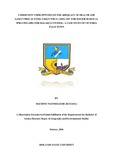Please use this identifier to cite or link to this item:
https://cris.library.msu.ac.zw//handle/11408/2134Full metadata record
| DC Field | Value | Language |
|---|---|---|
| dc.contributor.author | Machino, Ngonidzashe | - |
| dc.date.accessioned | 2017-06-22T15:53:11Z | - |
| dc.date.available | 2017-06-22T15:53:11Z | - |
| dc.date.issued | 2016-10 | - |
| dc.identifier.uri | http://hdl.handle.net/11408/2134 | - |
| dc.description.abstract | The study sought to assess community’s perceptions on the adequacy of health and safety precautions taken when using DDT for indoor residual spraying. Mixed methods were engaged in which collection of both qualitative and quantitative data collection techniques were used. Data was collected through the use of questionnaires and interviews. Questionnaires were randomly administered to a target population of ninety eight housing units. Interviews were also conducted with the key informants that are Victoria Falls Municipality Environmental Health Officer and Environmental Health technician. Questionnaires were used to gather information on Chinotimba suburb residents’ knowledge of health and safety risks associated with exposure to DDT, Safety and health precautions taken at household level as well as challenges associated with DDT for Indoor Residual Spraying. The study revealed that Chinotimba residents are not aware of the health and safety risks associated with exposure. Findings of the research revealed that majority of the respondents in Chinotimba suburb alluded that there are not taught on health and safety risks associated with DDT for Indoor Residual Spraying. Research showed that Chinotimba suburb residents take inadequate health and safety precautions during indoor residual spraying, research findings shows that education on health and safety precautions is done rarely usually on an annual basis and during the spraying season. The research also highlighted some of the major challenges associated with DDT for indoor residual spraying. These challenges vary from housing units to local authority. Most housing unit’s challenges are that mosquitoes are now resistant to DDT and that DDT soils the interior of their walls. The local authority face the challenge that people are less willing to attend education on DDT and there are less willing to have their houses sprayed. Generally Chinotimba suburb residents are not aware of health and safety risks associated with exposure to DDT hence they take inadequate health and safety precautions during Indoor Residual Spraying. In this regard the local authority should teach residents on risks associated with DDT in addition to intensifying education on health and safety precautions to observe during spraying. | en_US |
| dc.language.iso | en | en_US |
| dc.publisher | Midlands State University | en_US |
| dc.subject | Health and safety precautions, Indoor residual spraying | en_US |
| dc.title | Community’s perceptions on the adequacy of health and safety precautions taken when using DDT for Indoor Residual Spraying (IRS) for malaria control: A case study of Victoria Falls town. | en_US |
| item.languageiso639-1 | en | - |
| item.grantfulltext | open | - |
| item.fulltext | With Fulltext | - |
| Appears in Collections: | Bsc Geography And Environmental Studies Honours Degree | |
Files in This Item:
| File | Description | Size | Format | |
|---|---|---|---|---|
| DISSERTATION BY NGONI.pdf | Full text | 1.17 MB | Adobe PDF |  View/Open |
Page view(s)
88
checked on Jan 29, 2026
Download(s)
42
checked on Jan 29, 2026
Google ScholarTM
Check
Items in MSUIR are protected by copyright, with all rights reserved, unless otherwise indicated.



